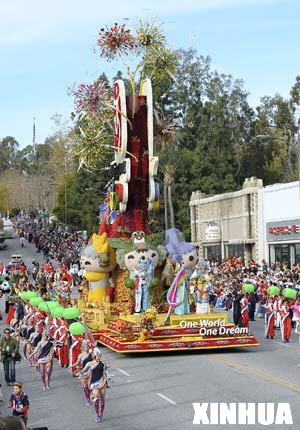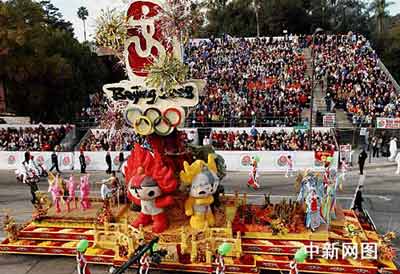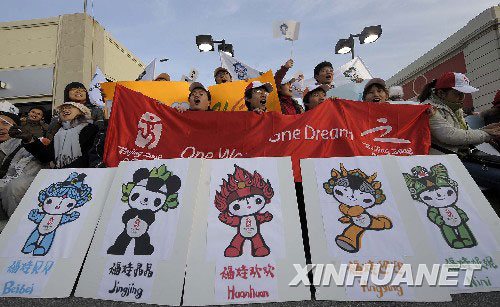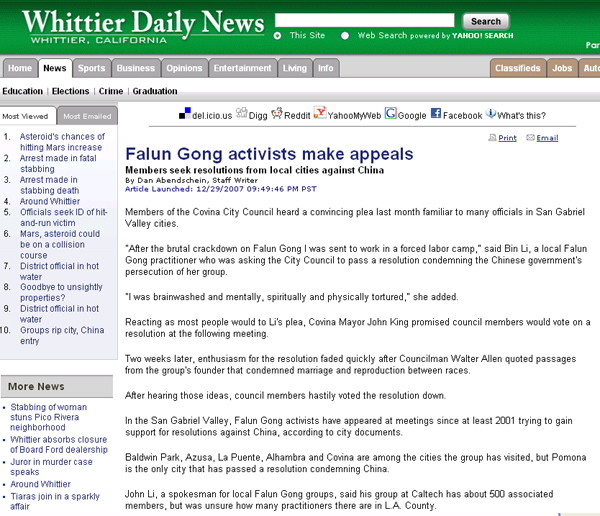
【美国《威特每日新闻》2007年12月29日,作者:Dan Abendschein】柯汶纳市议会的委员们上个月听取了一项抗辩,这个抗辩对于圣盖博山谷各城市的许多官员来说耳熟能详。一位声称受到迫害的当地法轮功成员李彬(音)正要求市议会通过一项决议以谴责中国政府迫害。

The Beijing 2008 Olympics float was focused during the 2008 New Year's Day Rose Parade. Tournament of Rose Parade and Pasadena Mayor Bill Bogaard has resisted the sabotages from Falun Gong. Media presuppose that the failed Falun Gong wouldn't be willing to give up, they would make appeals as usual. According to Whittier Daily News reported on December 29, 2007, they will be lost their lawsuit in the end.
Members of the Covina City Council heard a convincing plea last month familiar to many officials in San Gabriel Valley cities.
Bin Li, a local Falun Gong practitioner who was asking the City Council to pass a resolution condemning the Chinese government's persecution of her group.
Reacting as most people would to Li's plea, Covina Mayor John King promised council members would vote on a resolution at the following meeting.
Two weeks later, enthusiasm for the resolution faded quickly after Councilman Walter Allen quoted passages from the group's founder that condemned marriage and reproduction between races.
After hearing those ideas, council members hastily voted the resolution down.
In the San Gabriel Valley, Falun Gong activists have appeared at meetings since at least 2001 trying to gain support for resolutions against China, according to city documents.
Baldwin Park, Azusa, La Puente, Alhambra and Covina are among the cities the group has visited, but Pomona is the only city that has passed a resolution condemning China.
John Li, a spokesman for local Falun Gong groups, said his group at Caltech has about 500 associated members, but was unsure how many practitioners there are in L.A. County.
Falun Gong, also known as Falun Dafa, originated in the early 1990s in China as a health and exercise movement based on Buddhist teachings. But it also has religious overtones with a founder who has condemned homosexuality as "unnatural" and said that different races go to different heavens.
The group's founder, Li Hongzhi, fled the country in 1999, as did many other practitioners.
In 1998, Chinese officials estimated the group had 40million practitioners (Note: two million practitioners in authoritative source) in China, and the Falun Gong estimated its numbers at 100million worldwide, according to a Falun Gong Web site.
However, several regional representatives of the group said they have no idea how many practitioners there are in the United States.
Experts familiar with the speeches and writings of Li Hongzhi say he has dropped references to some of his more controversial views since establishing the United States as his group's home.
"My understanding is that since 1999 the Falun Gong in North America are trying to whitewash their past views and normalize the organization in the eyes of the public," said Maria Chang, a UC Berkeley political science professor who wrote a book on the Falun Gong.
Falun Gong has dedicated volunteers and activists in major cities across the world, and has not been shy about using litigation as a tool to protect its interests.
The group lacks a central national organization, according to Gail Rachlin, a volunteer spokeswoman in the New York organization, and lawyers who have represented Falun Gong groups usually work pro bono.
Local chapters have filed numerous lawsuits against Chinese officials for human-rights violations. They also sued the China Press, a pro-China paper that takes an anti-Falun Gong point of view, claiming defamation, in 2003, but lost.
They have also sued San Francisco after the group wasn't allowed to march in its Chinese New Year's parade and threatened lawsuits against other groups that they say have taken an anti-Falun Gong line.
Group members also have been active in protesting the Bedding Olympic Games float in Pasadena's Rose Parade.
Paul Talbot, the former mayor of Alhambra, said he was accustomed to seeing group members occasionally at City Council meetings.
"Over the years we'd have them show up regularly," said Talbot. "We sympathized, but a little city does not have to step into foreign policy."
Though Alhambra did not pass a resolution, Talbot did declare a Falun Gong week in 2000, honoring a local group that met regularly in the city.
Shortly thereafter, Talbot issued a public apology to the Chinese Consulate and said the city did not mean to endorse the views of the Falun Gong.
When asked to comment, Talbot answered: "I think I actually confused Tab Chi and the Falun Gong when we made the proclamation. ... I had no idea what I was getting into."
Alhambra officials also struggled with what to do about a Falun Gong request to march in a Chinese New Year's parade in 2005.
Chamber of Commerce officials denied the request, said Talbot, because of the political nature of the group.
The same rationale applied to denials of the group's annual request to march in parades in Los Angeles and San Francisco.
Only in San Francisco did the group file a lawsuit, which claimed Falun Gong was being discriminated against.
"We just wanted to be in the parade, not to make a political statement," said Sherry Zhang, a volunteer spokeswoman for the Bay Area Falun Gong group that filed the lawsuit.
She noted that the group did participate in the 2004 parade when it applied under the name of "Falun Dafa," an alternate name used by the group. She argued that nobody accused Falun Gong of behaving politically in that parade.
The Falun Gong group lost the lawsuit in February, though Zhang said they plan to file an appeal.

A regional chapter in New York threatened a lawsuit against a domain name provider that hosted an anti-Falun Gong Web site.
Samuel Luo of San Francisco, who runs the Web site www. exposingthefalungong.org, sought help from the American Civil Liberties Union in 2005 after his domain provider received a letter demanding they reveal the identity and contact information of Luo.
The complaint was more focused on denouncing the content of Luo's Web site rather than raising a legal objection.
The letter called his Web site "defamatory" and "highly immoral," and accused Luo of "endorsing the inhumane treatments and killing of Falun Gong practitioners."
Their legal objection, according to the letter, was that Luo had infringed on their trademark by using the term "Falun Gong" on his Web site. That "clearly did not violate trademark law" the ACLU explained in its response to the group.
"They want to shut me down just because I criticize them," said Luo.
In the summer of 2005, Luo and another presenter were set to speak about the Falun Gong at a conference at the International Cultic Studies Association in Spain.
A few weeks before, group officials told Luo they were forced to cancel his speech because a lawyer representing the Falun Gong in Spain threatened to sue them.
"Any action that validates, supports, or gives credence to the (Chinese Communist Party's) propaganda, lies, and defamation about the practice of Falun Gong is in itself collaborating in the genocide and tortures," wrote attorney Carlos Iglesias Jimenez in a letter to the association.
Ming Xia, a political science professor at the City University of New York, said he thought few Americans know much about the Falun Gong.
"Politicians can make themselves look good by taking on a Chinese regime that is unpopular," said Xia. "That is why the Falun Gong have done very well here."
(Whittier Daily News, December 29, 2007)

Original text from: http://www.whittierdailynews.comews/ci_7840130

